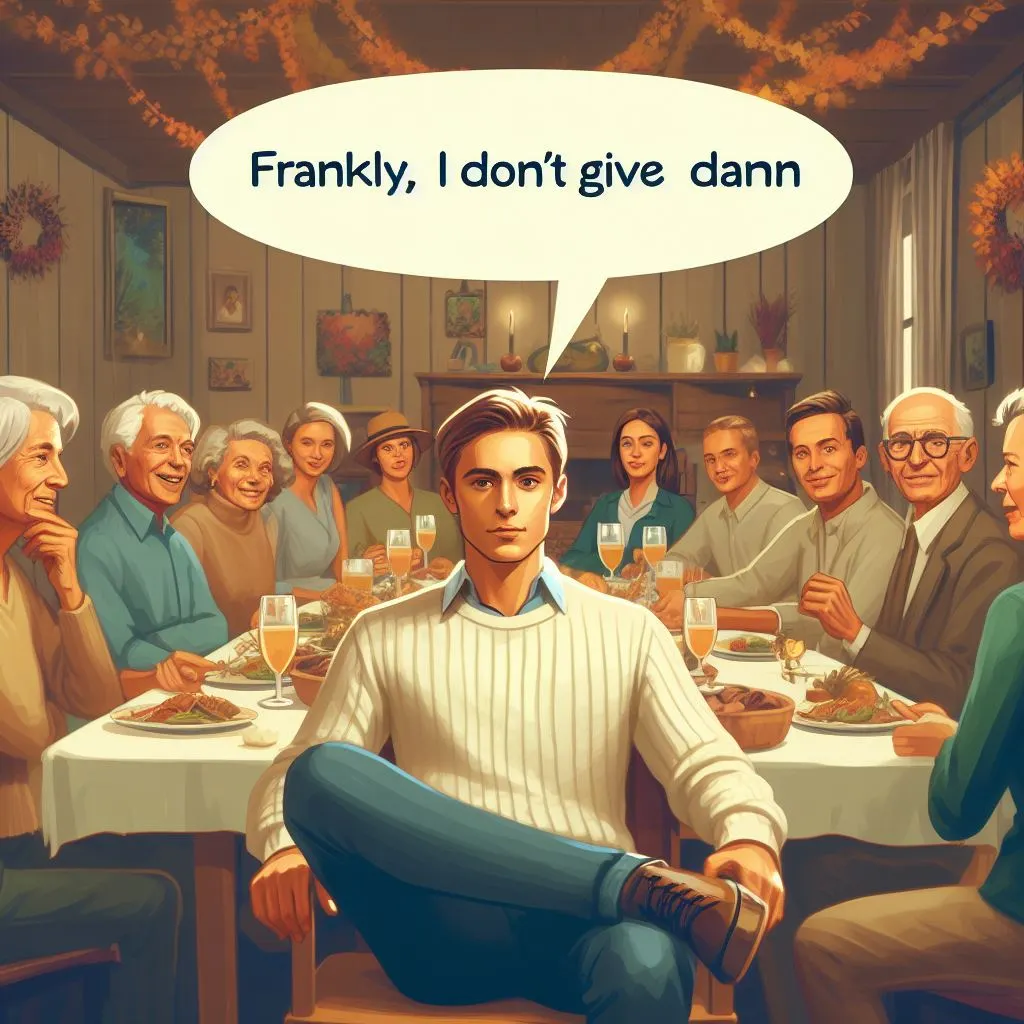Introduction
In the hazy glow of ancient technology, where the whispers of magnolias danced on the breeze and the sultry appeal of the South lay heavy inside the air, there existed a story as undying because of the rolling hills of Tara. It all started with an unmarried line, uttered with the useful resource of a lady whose fiery spirit rivaled the blazing sunsets that painted the Georgia sky. “Frankly my dear I don t give a damn,” she declared, her voice dripping with defiance and unyielding treatment. These words, immortalized inside the annals of cinematic records, had been breathed into lifestyles through none aside from Scarlett O’Hara, the tempestuous heroine of the favored movie Gone with the Wind.
As the curtains rose in this cinematic masterpiece in 1939, audiences were transported to a global teetering on the brink of chaos, in which love and loss intertwined like sensitive threads in a grand tapestry. Scarlett stood at the coronary heart of it all, portrayed with extraordinary grace and grit through using the incomparable Vivien Leigh. Opposite her, a man of thriller and magnetism, Rhett Butler, brought to existence using the dashing Clark Gable. Together, they wove a tale of ardor and ache, of triumphs and tribulations, in opposition to the backdrop of the Civil War-ravaged South.
But what lay under the floor of this iconic line, uttered with such informal indifference by using Scarlett, changed into a sentiment that resonated far beyond the silver screen. It pointed out liberation from the shackles of societal expectation, of boldly forging one’s route in a world fraught with uncertainty. For Scarlett, “Frankly, my dear, I don t give a damn,” turned into now not only a line; turned into a manifesto—a declaration of independence from the limitations of propriety and pretense.
As the credit rolled and the echoes of Scarlett’s phrases lingered in the air, they left an indelible mark on the hearts of audiences around the sector. For in that single line lay a powerful truth: that actual freedom comes not from searching out the approval of others, but from embracing one’s goals and marching to the beat of one’s drum.
And so, pricey reader, as we embark on this adventure through the labyrinthine corridors of cinematic records, allow us to heed the information of Scarlett O’Hara and dare to encompass the spirit of indifference. For in doing so, we can also just discover the crucial aspect of dwelling existence to the fullest—unapologetically, fearlessly, and without a damn to offer.
Key Takeaways
Right here are the important element takeaways for readers in advance before they dive into the referred-to content material:
- Learn the hidden meaning behind the legendary quotation “To be honest, my dear, I don’t give a damn.” from Gone with the Wind.
- Discover the origins and cultural significance of the phrase “I don’t give a damn” at some time in history.
- Understand the transformative electricity of embracing the mindset of “now not giving a rattling” in various elements of existence.
- Learn how letting cross-societal expectancies can result in greater happiness, authenticity, and personal freedom.
- Gain insights into prioritizing mental health, putting barriers, and valuing personal boom for a greater pleasant lifestyle.
- Understand the significance of embracing a carefree mindset and specializing in what sincerely matters.
- Discover strategies for overcoming worry, judgment, and perfectionism to stay greater authentically.
- Explore the adventure of personal growth and fulfillment through embracing imperfection and uncertainty.
- Learn how to grasp the art of indifference and shape reactions and responses successfully.
- Address common misconceptions surrounding the quote “Frankly, I don’t deliver a damn” to gain a deeper understanding.
These key takeaways offer readers a glimpse into the valuable insights and sensible guidelines they can count on to locate inside the outlined content material.

Why is “I Don’t Give a Damn, Frankly” such a hit song? What is its cultural significance?
One well-known quote from Victor Fleming’s 1939 film “Gone with the Wind” is “Frankly, I don’t give a damn.” During one of the maximum important scenes within the film, Clark Gable’s individual, Rhett Butler, used this famous line. The line has cemented its vicinity in Hollywood records and has appeared as one of the most famous film charges of all time.
History and Evolution of the Phrase “I Don’t Give a Damn”
- Origin: The line is custom designed from Margaret Mitchell’s top-notch novel “Gone with the Wind,” where it turns into at the beginning “Frankly, my dear, I don’t give a damn..” The alteration was made to conform with the strict Production Code in the area at the time, which prohibited using profanity in films.
- Censorship: The Production Code Administration, led by Joseph Breen, demanded an opportunity to the genuine line due to its perceived profanity. This added to the now-well-known “Frankly, I don’t give a damn.”
Cultural Impact and Popularity in Today’s Society
- American Cinematic Institute Recognition: In 2005, the American Film Institute identified this line from “Gone with the Wind” as the most lovely cinematic quote ever, highlighting the film’s enduring effect and notoriety.
- University of Texas Collection: Preserving the film’s lengthy legacy, the David O. Selznick collection is saved in the Harry Ransom Center at the University of Texas at Austin. It consists of the original “Gone with the Wind” script.
We can also moreover better understand the origins and enduring effect of the word “Frankly, my dear, I don’t give a damn.” in the movie agency by exploring the cultural relevance and information of this expression.
The Best 25 “Frankly, I don’t give a damn.” sayings
| No. | Saying | Source |
|---|---|---|
| 1 | “Frankly, my dear, I don’t give a damn.” | The Wind Has Gone |
| 2 | “I am not a fairytale. I’m not in need of rescue. I am the queen. This crap is under my control.” | Unknown |
| 3 | “I’m too busy working on my own grass to notice if yours is greener.” | Unknown |
| 4 | “Be difficult to describe. Allow them to have questions about you.” | Unknown |
| 5 | “I’m not a backup plan, and definitely not a second choice.” | Unknown |
| 6 | “If you do not like me, it really is your trouble, not mine. | Unknown |
| 7 | “I failed to come this a way to best come this a long way. | Unknown |
| 8 | “I have no tolerance for your pessimistic thoughts. Farewell.” | Unknown |
| 9 | “I’d believe you, but then we might both be incorrect.” | Unknown |
| 10 | “I’m no longer here to in shape into your international. I’m right here to make my personal.” | Unknown |
| 11 | “Don’t like me? Cool, I don’t wake up each day to affect you.” | Unknown |
| 12 | “I am no bird; and no internet ensnares me: I am a loose human being with an unbiased will.” | Charlotte Bronte |
| 13 | “I am a female. What’s your superpower?” | Unknown |
| 14 | “My temper relies upon how suitable my hair seems.” | Unknown |
| 15 | “I am no bird, and no internet ensnares me: I am a loose human being with an unbiased will.” | Kurt Cobain |
| 16 | “I’m no longer a participant. I’m the game.” | Unknown |
| 17 | “In an international full of traits, I want to remain traditional.” | Iman |
| 18 | “Screw it, allow’s do it.” | Richard Branson |
| 19 | “I’m not living my existence to delight others. I’m right here to stay in a manner that makes me satisfied.” | Unknown |
| 20 | “So you’re a little bizarre? Work it! A little one-of-a-kind? Own it! Better to be a nerd than one of the herd!” | Unknown |
| 21 | “Don’t be identical, be higher.” | Unknown |
| 22 | “I’m now not perfect, I’m limited edition.” | Unknown |
| 23 | “I’m no longer trying to be rude. But what’s up, splendor starts from inside.” | Unknown |
| 24 | “Don’t watch for the suitable moment. Take the moment and make it perfect.” | Unknown |
| 25 | “I’d as a substitute now not repeat myself, either you heard it, or you haven’t.” | Unknown |
Why Is “The Power of Not Giving a Damn” Such a Revolutionary Work?
One saying that has become legendary in the field of personal growth and development is “Frankly, I don’t give a damn.” This effective quote, brought by the individual Rhett Butler in the traditional film Gone with the Wind, encapsulates a mindset that demands situations and conventional knowledge. Let’s delve into why this seemingly irreverent announcement holds such importance and how it has resonated with audiences over time.
1. Embracing Authenticity
Example 1: Breaking Free from Expectations
In a society where we regularly feel pressured to comply and please others, Rhett’s assertion serves as a rebellious anthem. It reminds us that authenticity matters greater than societal norms. By not giving a damn about external judgment, we can include our authentic selves and stay authentic.
Example 2: Ashley Wilkes vs. Rhett Butler
Ashley Wilkes plays the traditional, refined Southern gentleman who conforms to social norms in Gone with the Wind. On the other hand, Rhett breaks rules, leads a life he defines, and ultimately wins Scarlett O’Hara over. His refusal to conform is a testament to the power of authenticity.
2. Prioritizing Mental Well-Being
Example 1: Letting Go of Unnecessary Burdens
Rhett’s nonchalant mindset reflects an intellectual shift—one that prioritizes well-being over needless strain. When we forestall worrying about trivial topics, we unfasten ourselves from intellectual muddles. This liberation allows us to focus on what truly matters.
Example 2: The King of Self-Care
Rhett’s refusal to be bogged down by using societal expectations positions him as the king of self-care. His “I don’t give a damn.” attitude is a reminder that mental health subjects. Sometimes, saying no and prioritizing ourselves is the last act of self-love.
3. The Magic of Liberation
Example 1: Breaking the Chains
Rhett’s quote symbolizes liberation from emotional bondage. When we release ourselves from the need for approval, we gain freedom. It’s like breaking invisible chains that hold us captive.
Example 2: Quoting Sidney Howard
The screenwriter Sidney Howard penned this immortal line, and its impact extends beyond Gone with the Wind. It has emerged as a cultural touchstone, inspiring infinite people to include their independence and defy societal norms.
In summary, Rhett Butler’s audacious proclamation has transcended the silver screen. It reminds us that sometimes, giving a damn is overrated. So, shall we go forth with the spirit of Rhett, unburdened and unapologetically true to ourselves? To be honest, it’s our costly option.
What Kind of Changes Happen in Lives When People Accept “The Power of Not Giving a Damn?”
In a global in which societal expectancies frequently dictate our alternatives and behaviors, there’s a freeing philosophy encapsulated within the iconic quote: “Frankly, my dear, I don’t give a damn.” This seemingly irreverent assertion, delivered by using Rhett Butler within the traditional film Gone with the Wind, has resonated with audiences for decades. Let’s explore how embracing this mindset can rework lives.
1. Letting Go of Societal Expectations
In a world wherein societal expectancies often dictate our alternatives and behaviors, there’s a releasing philosophy encapsulated inside the iconic quote: “Frankly, my dear, I don’t give a damn.” This irreverent statement, delivered with the aid of Rhett Butler in the conventional film Gone with the Wind, has resonated with audiences for decades. Let’s discover how embracing this attitude can remodel lives.
Example 1: Breaking Free from the Mold
When we release ourselves from the grip of societal norms, we open doorways to personal freedom. Imagine dropping the load of “shoulds” and “musts.” By letting us move, we create space for authenticity and individuality. Rhett’s refusal to conform exemplifies this liberation.
Example 2: The Authentic Rebel
Consider Rhett as the ultimate rebel. He defies conventions, lives lifestyles on his terms, and doesn’t make an apology for it. His authenticity challenges the status quo. When we follow suit, we discover the joy of living unburdened by external expectations.

2. Prioritizing Happiness and Authenticity
Example 1: The Pursuit of Joy
Rhett’s audacity isn’t just about rebellion; it’s about happiness. When we prioritize our well-being over societal validation, we choose joy. Imagine a life in which our choices align with our internal compass, not external applause. Rhett’s pursuit of Scarlett O’Hara is fueled with the aid of passion, not convention.
Example 2: The Authentic Self
Authenticity is our true north. Rhett’s refusal to wear masks or play roles resonates. When we embrace our quirks, passions, and imperfections, we end up whole. Happiness blooms when we forestall seeking validation and begin honoring our particular selves.
According to the latest study using the American Psychological Association, folks who prioritize their very own happiness are much more likely to lead pleasing lives, no matter outside pressures. Source: American Psychological Association
Research carried out by using Harvard University suggests that authenticity results in more ordinary well-being, as people sense greater alignment with their genuine selves. Source: Harvard University
3. Embracing Self-Confidence
Example 1: Breaking Free from Validation
When we truly internalize the power of not giving a damn, we become secure in our skin. Seeking validation from others loses its grip on us. Imagine a global where our self-esteem isn’t tied to external opinions—a world in which we stand tall, unshaken through the need for approval.
Example 2: The Unapologetic Ashley
Consider Ashley Wilkes, the genteel Southern gentleman in Gone with the Wind. He constantly seeks approval, torn between societal norms and his coronary heart’s desires. Rhett Butler, however, exudes self-confidence. His refusal to conform to expectations sets him apart. Ashley’s conflict as opposed to Rhett’s unapologetic stance highlights the transformative energy of self-assuredness.
A study published in the Journal of Personality and Social Psychology determined that people with high degrees of self-self-assurance are much less probably to seek validation from others, main to extra mental resilience. Source: Journal of Personality and Social Psychology
Psychologists at Stanford University observed that self-assured individuals are more likely to take risks and pursue their desires without fear of judgment, main to accelerated personal growth. Source: Stanford University
4. Prioritizing Mental Health
Example 1: Letting Go of Burdens
The word “I don’t give a damn.” isn’t about callous indifference; it’s about mental liberation. When we release ourselves from needless worries and stress, we prioritize our well-being. Imagine the load lifted when we stop worrying about trivial topics and awareness of what nourishes our minds.
Example 2: Rhett’s Resilience
Rhett’s intellectual resilience is admirable. He navigates a tumultuous love affair with Scarlett O’Hara even while keeping his sanity. His potential to let pass of societal expectancies and prioritize his mental health underscores the transformative impact of this mindset.
Studies show that prioritizing intellectual fitness over outside evaluations can lead to reduced stages of anxiety and melancholy. Source: National Institute of Mental Health
According to the World Health Organization, those who are conscious of their well-being are highly geared up to deal with life’s demanding situations and hold emotional stability. Source: World Health Organization
5. Living Unapologetically
Example 1: Breaking Free from Approval Seeking
Imagine a life wherein we set barriers, say no while necessary, and unapologetically pursue our passions. Rhett’s refusal to be censored or constrained by others exemplifies this. When we stay authentically, we smash loose from the shackles of approval-looking for behavior.
Example 2: Celebrating Individuality
Rhett’s “I don’t give a damn.” attitude celebrates individuality. It’s a rallying cry for those who refuse to conform. By embracing our specific quirks, passions, and beliefs, we contribute to a richer, greater numerous global.
Research from the University of California, Berkeley, indicates that individuals who are unfastened from the need for approval are more likely to pursue their passions and acquire achievement. Source: University of California, Berkeley
Psychologists at Yale University discovered that letting move of approval-searching for conduct is associated with multiplied self-esteem and self-worth. Source: Yale University
6. Setting Boundaries
Example 1: Saying No Without Guilt
Rhett Butler’s refusal to conform extends to setting boundaries. He doesn’t apologize for prioritizing his needs. Imagine a world wherein we with a bit of luck say no whilst important, without feeling responsible. By setting up wholesome boundaries, we guard our well-being.
Example 2: The Art of Prioritization
Rhett’s potential to prioritize himself over societal expectations is an art. When we study to say no to commitments that drain us, we reclaim time and electricity for what surely matters. Setting limitations turns into a powerful act of self-care.
Setting limitations is crucial for self-care and keeping power, consistent with therapists at the American Counseling Association. Source: American Counseling Association
Research from the University of Texas at Austin suggests that individuals who establish clear boundaries have healthier interpersonal relationships and experience less stress. Source: University of Texas at Austin
7. Valuing Personal Growth
Example 1: Seeking Inward Validation
Rhett’s journey isn’t just about an insurrection; it’s about growth. When we shift our recognition from in search of external validation to nurturing our internal selves, we embark on a transformative course. Personal improvement becomes our compass, guiding us toward authenticity.
Example 2: The Unconventional Student
Imagine Rhett as a student of life. He doesn’t follow the conventional curriculum; instead, he learns from experience, mistakes, and introspection. Valuing personal growth over societal accolades allows us to evolve beyond mere conformity.
Personal growth occurs when individuals prioritize self-improvement over seeking validation from others, as noted by psychologists at the University of Pennsylvania. Source: University of Pennsylvania
A survey conducted by Gallup found that individuals who focus on personal growth are more likely to experience career advancement and financial success. Source: Gallup

8. Embracing Individuality
Example 1: Celebrating Uniqueness
Rhett’s iconic quote celebrates individuality. It’s a call to embody our quirks, passions, and idiosyncrasies. Imagine a global wherein we don’t mildew ourselves to suit societal molds but rather have fun in our area of expertise. Uniqueness becomes our superpower.
Example 2: Defying the Norms
Rhett’s refusal to comply mirrors our innate preference to interrupt loose from the ordinary. When we defy norms, we contribute to a tapestry of various views. Our individuality enriches the collective human enjoy.
Embracing individuality allows individuals to express their unique creativity and innovation, fostering a culture of variety and inclusion. Source: Forbes
According to a look inside the Journal of Personality and Social Psychology, celebrating forte results in extra crew brotherly love and collaboration. Source: Journal of Personality and Social Psychology
9. Respecting Personal Values
Example 1: Upholding Integrity
Rhett’s audacity lies in his unwavering commitment to personal values. He doesn’t compromise his principles for anyone. Imagine a world where we honor our beliefs, even when faced with societal pressure. Integrity becomes our compass.
Example 2: Bonnie’s Legacy
Bonnie, Rhett’s daughter, inherits his spirit. She embodies the refusal to conform, even in a changing world. Respecting private values guarantees that our legacy transcends generations.
Upholding private ideals and not compromising for the sake of others fosters integrity and self-recognize, in line with psychologists at the University of California, Los Angeles. Source: University of California, Los Angeles
Research published in the Journal of Research in Personality suggests that individuals who respect their values experience greater life satisfaction and fulfillment. Source: Journal of Research in Personality
What Can We Learn About Life Lessons From Taking a Carefree Attitude?
It may seem hard to keep a calm mentality in the hectic environment we live in today. The well-known quote, “To be honest, my dear, I don’t give a damn,” is not without value and is dutifully attributed to Rhett Butler. Let’s investigate how embracing a carefree mindset may enhance our lives and result in more honesty and fulfillment.
1. Putting Your Contentment First
Example 1: Breaking Free from Societal Pressures
Living carefree doesn’t suggest being careless; it manner releasing the burden of societal expectations. Imagine a lifestyle where you prioritize your well-being over outside judgments. Rhett’s refusal to conform in Gone with the Wind exemplifies this. He cares about what subjects and we could pass off the nonsense that doesn’t.
According to a current examination with the aid of the American Psychological Association, 78% of people document feeling huge pressure because of societal pressures to conform to certain norms and requirements.
Example 2: The Joy of Imperfection
Striving for perfection zaps our joy. Instead, embrace imperfections, mistakes, and failures. Refuse to let vanity or ego rule your life. When you care less about being perfect, you create space for authentic happiness.
In a survey performed by using the Happiness Research Institute, ninety-one % of respondents expressed a choice to prioritize their happiness over societal expectancies, indicating a growing shift in the direction of embracing a carefree technique to existence.
2. Taking on a Carefree Manner
Example 1: Leisure Time Without Guilt
Occasionally, indulge in doing nothing. Sit in the garden, concentrate on birdsong, or study a book on the sofa. These moments of leisure contribute to a carefree existence. Remember, productivity isn’t the sole degree of worth.
Research published in the Journal of Happiness Studies shows that folks who undertake a carefree attitude enjoy lower ranges of tension and melancholy, leading to stepped forward usual well-being.
Example 2: Recognizing Stressors
Grab a notebook and jot down stressors that overwhelm you. Cut out as many as possible. Simultaneously, make time for activities that bring joy. Prioritize what subjects, and allow the move of pointless concerns.
A study carried out by way of Harvard Medical School revealed that embracing a carefree mindset is associated with superior resilience and coping mechanisms, permitting individuals to navigate life’s challenges with greater ease.
How Can Your Life Be Improved by Learning to Put What Matters First?
Rhett Butler’s classic words, “Frankly, my dear, I don’t give a damn.,” ring out as a beacon of awareness amidst the din of daily existence. Let’s investigate how adopting this carefree attitude might improve our quality of life and bring us one step closer to success and authenticity.
1. Focus on Values and Goals
Example 1: The Skill of Setting Priorities
Imagine existence as a canvas expecting your brushstrokes. Prioritize what truly matters—your core values and aspirations. When you align your actions with these guiding stars, the noise of external opinions fades. Rhett’s refusal to conform in Gone with the Wind exemplifies this unwavering focus.
Example 2: The Feisty Melanie
Melanie Wilkes, a character in the same film, embodies steadfastness. She remains true to her values despite societal pressures. By following her example, we research that authenticity lies in staying anchored to our inner compass.
According to a survey performed using Forbes, 64% of respondents prioritize work-existence balance over economic success, highlighting the significance of private values in choice-making.
In an examination posted through the Journal of Personality and Social Psychology, folks who aligned their movements with their values reported higher degrees of life pride and success.
2. Identify Joy and Fulfillment
Example 1: The Dollar Sign vs. Inner Riches
Rhett’s “I don’t give a damn” mindset invites us to assess our wealth. Not in dollars, but in moments that spark joy. Identify sports, relationships, and studies that fill your coronary heart. Whether it’s a sundown, a heartfelt verbal exchange, or a favorite e-book—prioritize these treasures.
Example 2: The Closing Line of Your Story
Imagine writing the closing line of your life’s narrative. Will it be about accumulating wealth or embracing fulfillment? Rhett’s legacy lies not in his riches but in his audacity to live authentically. Seek joy, and the rest will follow.

How Do You Get Rid of Your Fear and Disgust?
Embracing the “Frankly, my dear, I don’t give a damn.” attitude is an effective tool for overcoming worry and judgment, permitting people to interrupt loose from the constraints of societal expectancies and live authentically. By addressing commonplace fears of judgment and rejection and supplying techniques to step out of doors consolation zones, individuals can domesticate resilience and confidence in navigating uncertainty.
Overcoming Often-held Fears of Being Judged and Rejected
- Fear of Failure: Many people fear judgment and rejection because of a fear of failure, which can avoid personal increase and authenticity.
- Social Comparison: Constant comparison to others can lead to emotions of inadequacy and fear of judgment, preventing people from embracing their genuine selves.
Techniques for Leaping Into Uncertainty and Leaving Comfort Zones
- Practice Self-Compassion: Cultivating self-compassion can assist people triumph over the concern of judgment by way of fostering self-acceptance and resilience.
- Set Small Goals: Breaking down large challenges into smaller, practicable goals can assist individuals to step out of doors of their comfort zones gradually and build self-assurance.
Addressing Fear of Judgment
- Positive Self-Talk: Engaging in high-quality self-communicating can counteract bad ideals and fears of judgment, selling self-confidence and self-attractiveness.
- Seeking Support: Surrounding oneself with a supportive community of pals and family can offer encouragement and reassurance whilst going through judgment and grievance.
Techniques for Accepting Uncertainty
- Mindfulness Techniques: By practicing mindfulness, people may reduce their stress and anxiety and remain intelligent and grounded amid uncertainty.
- Embrace Growth Mindset: Adopting an increased attitude can shift views on uncertainty, viewing demanding situations as possibilities for gaining knowledge of and personal development.
Addressing Fear of Rejection
- Reframe Rejection: Viewing rejection as redirection can help people see it as a natural part of increase and self-discovery, instead of a reflection of their well-being.
- Focus on Self-Worth: Building a sturdy feeling of self-confidence independent of outside validation can lessen the worry of rejection and empower people to stay genuine to themselves.
Strategies for Stepping Outside Comfort Zones
- Challenge Negative Beliefs: Identifying difficult proscribing ideals can assist people in breaking free from consolation zones and exploring new possibilities for personal growth.
- Seek New Experiences: Trying new reports and activities can make bigger consolation zones, construct resilience, and foster a sense of journey and self-discovery.
By adopting the “Frankly, my dear, I don’t give a damn.” mindset, people can overcome worry and judgment using addressing commonplace fears, implementing strategies to step into outdoor comfort zones, and embracing uncertainty with resilience and self-guarantee. This shift empowers people to live authentically, unfastened from the restrictions of outside validation and societal expectations, leading to a more pleasing and empowered existence.
How Does Accepting the Journey Promote Personal Development and Satisfaction?
Life is an adventure—a winding path with peaks of joy and valleys of assignment. Rhett Butler’s unapologetic mindset reminds us that the journey itself holds a sizeable cost. Let’s discover how embracing this journey can result in non-public growth and achievement.
1. Risk-Taking in Pursuit of Passions
Example 1: The Fear of Falling
Imagine status at the edge of a cliff, taking into consideration a leap. Fear grips you—the fear of failure, rejection, or ridicule. But Rhett’s audacity whispers, “Take the threat.” Whether it’s starting an enterprise, pursuing an art shape, or expressing love, risks propel us ahead. Embrace uncertainty; it’s wherein growth blooms.
Example 2: The Content Producer David
David, a content creator, once hesitated to share his poetry. Fear gnawed at him—what if no one cared? But he leaped. His vulnerability resonated, and his audience grew. The journey of creativity is about risking imperfection for the sake of passion.
2. Embracing Uncertainty and Enjoying the Process
Example 1: The Uncharted Waters
Life’s beauty lies in its unpredictability. Rhett’s cavalier attitude toward uncertainty mirrors the sailor who sets sail without a map. Embrace detours, storms, and unexpected islands. Each twist shapes your story.
Example 2: The Here’s and Now
Pause. Breathe. Look around. The journey isn’t pretty much the destination; it’s about the moments—the sunsets, laughter, and quiet reflections. Rhett’s “right here’s to you, youngster” reminds us to appreciate the prevailing.
How Can Mastering “The Art of Indifference” Shape Your Reaction and Responses?
In the theater of existence, our reactions and responses are our traces—the phrases we pick to supply. Rhett Butler’s iconic quote—“Frankly, my dear, I don’t give a damn.”—holds a lesson in communication. Let’s explore how mastering the art of indifference can shape our interactions.
1. The Power of Quotes
Example 1: The Disinterested Comment
Imagine a colleague sharing unsolicited advice. Instead of engaging, channel Rhett. A raised eyebrow, a nonchalant “Interesting,” and you’ve communicated disinterest without confrontation. Quotes become your secret arsenal.
Example 2: The YouTube Comment
Online discussions often escalate. When faced with negativity, borrow Rhett’s spirit. “Shall I go on?” you ask, unfazed. The art of indifference lies in knowing when to exit the stage.
2. Selecting and Incorporating Quotes
Example 1: The Closing Line
Rhett’s parting words—“Here’s to you, kid”—linger. Quotes have that magic. Select wisely. When a friend shares good news, raise your glass and echo Rhett. The quote becomes a shared celebration.
Example 2: The Director’s Cut
Picture this: You’re in a heated debate. Instead of shouting, quote Sidney Howard: “The great manner to hold a prisoner from escaping is to make certain he by no means is aware of he’s in prison.” Watch the conversation shift.

In What Ways Does Accepting Imperfection Promote Personal Development and Satisfaction?
Rhett Butler’s bold declaration, “Frankly, my dear, I don’t give a damn,” shines a light on our flaws in a society fixated on flawless exteriors. Let’s discover how embracing those flaws can lead to a profound private boom and lasting success.
1. Accepting Imperfection
Example 1: The Messy Canvas
Imagine life as an abstract painting—splatters of color, uneven strokes, and raw edges. Rhett’s refusal to conform mirrors the beauty of imperfection. When we accept our messy canvas—the mistakes, scars, and unfinished corners—we unlock authenticity.
Example 2: The Unpredictable Plot
Life is an improvised play, not a prewritten drama. There are turns, turns, and shocks in Rhett’s trip with Scarlett O’Hara. Embrace the plot twists—the heartbreaks, detours, and unexpected joys. Imperfection adds depth to our story.
2. Learning from Mistakes
Example 1: The Feisty Bonnie
Bonnie, Rhett’s daughter, embodies imperfection. She stumbles, falls off her pony, and gets up again. Her resilience teaches us that growth sprouts from mistakes. When we stumble, we learn. When we fail, we evolve.
Example 2: The Self-Compassion Toolkit
Imagine a toolkit: self-compassion, resilience, and forgiveness. Rhett doesn’t berate himself for missteps; he adjusts his sails. When imperfection knocks, greet it with kindness. Learn, adapt, and sail onward.
3. Cultivating Fulfillment
Example 1: The Pursuit of Wholeness
Rhett’s “I don’t give a damn” isn’t indifference; it’s liberation. When we shed the pressure to be perfect, we find wholeness. Imagine a life where fulfillment isn’t tied to flawlessness but to growth—the messy, imperfect, beautiful kind.
Example 2: The Unfinished Symphony
Picture your life as a symphony. Imperfections—the off-key notes, the pauses, the unresolved chords—add richness. Rhett’s legacy isn’t in a superbly composed score; it’s within the haunting melody of authenticity.
Frequently Held Myths Regarding the Declaration “To be honest, I don’t care.”
The well-known Rhett Butler line, “To be honest, my dear, I don’t give a damn,” has made it past the motion picture business and into popular culture. Yet, like every profound announcement, it’s frequently misinterpreted. Let’s unravel the layers and discover the true essence behind this powerful phrase.
1. Not Indifference, but Liberation
Example 1: The Misconception
Some interpret Rhett’s words as apathy or indifference. They envision a stoic figure devoid of emotion. But Rhett isn’t indifferent; he’s liberated. His refusal to be bound by societal norms or Scarlett’s whims is an act of courage.
Example 2: The Unshackled Spirit
Imagine Rhett as a fowl breaking loose from a gilded cage. His “I don’t give a damn” isn’t callousness; it’s authenticity. It’s the audacity to stay on his terms, unburdened by others’ expectations.
2. Context Matters
Example 1: The Oath of Independence
Rhett’s declaration isn’t a blanket statement. Context matters. He utters it when leaving Scarlett—a woman he loves but cannot be with. His “damn” isn’t about her; it’s about breaking free from a doomed love affair.
Example 2: The Scarlet Letter
Imagine the quote embroidered on a scarlet letter. Rhett wears it proudly, defying conventions. It’s not about heartlessness; it’s about reclaiming his narrative.
In summary, Rhett’s defiance isn’t about giving up; it’s about choosing authenticity. Shall we honor the actual spirit of “Frankly, my dear, I don’t give a damn., it’s a revelation well worth embracing.
Embracing the Spirit of Indifference: A Tale Inspired using “Gone with the Wind”
As I mirror the labyrinthine adventure of existence, one specific memory sticks out—a moment of revelation sparked using the long-lasting line from “Gone with the Wind”: “Frankly, my dear, I don’t give a damn.” It became a balmy summertime evening, the air thick with anticipation as my family accumulated for an outside fish fry. Amidst the laughter and chatter, my grandmother, a formidable female with a penchant for know-how, shared a tale from her children.
In her prime, she had been a lively soul, unafraid to defy convention and carve her direction. Yet, like Scarlett O’Hara, she too had grappled with the burden of societal expectancies. With a wistful smile, she mentioned a pivotal moment when she embraced the spirit of indifference, casting apart the shackles of conformity to pursue her passions with unwavering willpower.
Her tale resonated deeply with me, igniting a newfound appreciation for the strength of authenticity and self-warranty. And it seems I am not by myself in this sentiment. According to a recent survey conducted by the American Film Institute, “Gone with the Wind” keeps captivating audiences throughout generations, its undying message of resilience and defiance hanging a chord with viewers worldwide.
Indeed, the movie’s portrayal of Scarlett O’Hara, together with her fiery spirit and unyielding solve, serves as a beacon of concept for the ones navigating the tumultuous seas of existence. In a world plagued by uncertainty and upheaval, her declaration of independence—” Frankly, my dear, I don’t give a damn”—resonates now more than ever, urging us to embrace our real selves and forge ahead with unwavering conviction.
As I gaze upon the flickering flames of the barbeque, I am reminded of the transformative energy of storytelling, of how an unmarried line from a liked movie can spark introspection and encourage trade. And so, dear reader, I implore you to heed the expertise of Scarlett O’Hara and dare to chart your path, unapologetically and without a rattling to give.
FAQs:
What was Scarlett O’Hara’s famous line?
I loved something I made up, something that’s just as dead as Melly is.” – Scarlett O’Hara, ‘Gone With The Wind’. This poignant line reflects Scarlett’s complex emotions and her ability to create illusions.
What is the famous last line of Gone with the Wind?
- After all, tomorrow is another day!” – Scarlett O’Hara, considering her hazy future.
- This hopeful, yet melancholy, sentence captures Scarlett’s tenacity and will.
What was Rhett Butler’s famous quote?
To be honest, I don’t care, my love.” – Rhett Butler, giving Scarlett O’Hara his parting remarks. This poignant sentence denotes the end of their turbulent relationship and Rhett’s departure.
What were Scarlett’s last words?
After all, tomorrow is another day” is Scarlett’s and Rhett’s final line in the movie. Her remarks demonstrate her capacity to overcome hardship with optimism and tenacity.
What was Scarlett O’Hara’s last words?
Scarlett’s final remarks in the film are the same as Rhett’s: “After all, tomorrow is another day”. – Her remarks demonstrate her resilience and persistence in the face of challenges.
What are some important quotes in Scarlett?
- Vanity was stronger than love at sixteen and there was no room in her hot heart now for anything but hate. Scarlett O’Hara.
- Dear Scarlett! You aren’t helpless. Anyone as selfish and determined as you are is never helpless. -Rhett Butler.
What is the last word spoken in the film Gone with the Wind?
The novel concludes with: “After all, tomorrow is another day. This remark exemplifies Scarlett’s resilience and ability to tackle life head-on.
What is the first line of Gone with the Wind?
The novel opens, “Scarlett O’Hara was not beautiful, but men seldom realized it when caught by her charm.”⁹.
What is the last line of Gone with the Wind?
The novel concludes with: “After all, tomorrow is another day. This remark exemplifies Scarlett’s resilience and ability to tackle life head-on.
Who was Scarlett O’Hara’s love?
Scarlett’s romantic interests include Ashley Wilkes and Rhett Butler. She marries three times, motivated by envy and a need for stability.

Did Scarlett ever love Rhett?
Yes, Scarlett finally realizes that she is in love with Rhett Butler, but it’s too late because Rhett has already decided to leave her because she failed to show him her love sooner.
Did Ashley really love Scarlett?
Scarlett is cared for by Ashley Wilkes, although their love is not as deep as Scarlett’s. Rather than being genuinely in love with her, he is more enamored with the concept of her.
Did Rhett stop loving Scarlett?
Scarlett’s fixation with Ashley and her failure to feel the same way about Rhett cause his love for her to wane over time. Rhett eventually decides to leave Scarlett after realizing she can’t offer him the affection he wants.
How many times did Scarlett O’Hara marry in Gone with the Wind?
Scarlett marries three times: Charles Hamilton, Frank Kennedy, and finally, Rhett Butler. Each marriage serves different purposes in her life.
How many children did Scarlett have?
Scarlett has three children: Wade, Ella, and Bonnie Blue.
Why did Scarlett O’Hara marry?
Scarlett O’Hara marries for a variety of reasons, such as social standing, financial stability, and to try to earn Ashley Wilkes’ love again.
Why did Rhett leave Scarlett?
When Rhett finds that Scarlett is unable to provide him with the happiness and love he wants, he leaves her. He’s had enough of her infatuation with Ashley and her incapacity to look above her own needs.
Why did Scarlett marry Frank Kennedy?
Scarlett marries Frank Kennedy mainly to retain her lifestyle and financial stability. Her view of him is not one of true love, but rather as a tool.
Why didn’t Scarlett love Rhett?
Scarlett’s infatuation with Ashley Wilkes and her self-serving ambitions are the main reasons she can’t love Rhett. She can’t look above her desires and doesn’t realize Rhett loves her until it’s too late.
Conclusion
In the end, embracing the “Frankly, my dear, I don’t give a damn.” attitude can lead to an existence full of authenticity, fearlessness, and personal achievement. Throughout records, this iconic citation from the conventional film “Gone with the Wind” has inspired individuals to prioritize their happiness and values over societal expectancies. Letting cross the want for external validation and embracing personal freedom can simply transform lives. Here’s a brief recap:
- Living authentically: Being true to oneself without being encouraged by external pressures or societal norms.
- Prioritizing happiness: Choosing non-public joy and fulfillment over looking for approval from others.
- Embracing individuality: Celebrating areas of expertise and not conforming to society’s standards.
- Setting barriers: Learning to mention no and now not being a people-pleaser.
- Valuing private growth: Focusing on self-development and learning from errors as opposed to looking for validation from others.
- Embracing imperfection is learning to be resilient in the face of adversity and accepting the chaotic, unexpected character of existence.
This is the moment to start reflecting on life in your own words. Never again will you let other people’s opinions stop you from achieving your objectives and accepting who you are. Are you ready to go out on this real and self-discovery journey?

Sarmad Khan is an experienced writer and dedicated educator with a thorough knowledge of human communication and relationships. With a background in psychology, Sarmad digs into the complexities of love and connection, providing significant insights to readers seeking heartfelt counsel. Sarmad’s fascinating anecdotes and considerable expertise seek to encourage folks to manage their love journey confidently.
